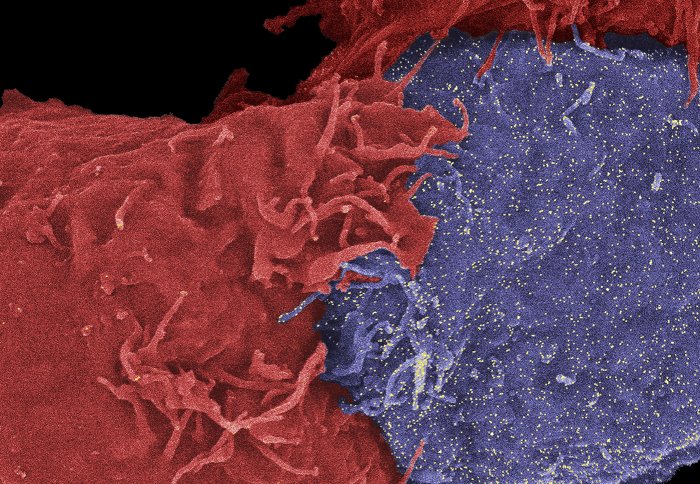Natural killer cells may be key players in asthma
by Sam Wong

Natural killer cells (red) attacking a target cell (blue). Image produced by Geoffrey Williams and Daniel M Davis.
Agents of the immune system called natural killer (NK) cells may have an important role in asthma, according to research.
NK cells are best known for eliminating cancer cells and cells infected by viruses, but the new study suggests that they might be partly to blame for inflammation in the airways in asthma.
Asthma affects around 300 million people worldwide. For most, the disease can be managed with medicine, but around five per cent of people with asthma are unable to control their condition with the drugs available.
Researchers at Imperial College London studied mice that were missing a protein that switches on the killer cells. They found that these mice don’t suffer from asthma-like allergic reactions.
If the findings apply to humans, it could mean that drugs designed to quell the activity of NK cells could have a role in asthma treatment.
Asthma attacks occur when an allergen, such as the house dust mite, is recognised by immune cells, which release chemical signals summoning other types of immune cells and causing inflammation in the airways. Scientists don’t fully understand which cells are involved in the reaction and which molecules regulate this process, but doing so would help develop better asthma treatments.
The study, published in the Journal of Allergy and Clinical Immunology, was performed by Nazanin Farhadi and led by Dr Fiona Culley at the MRC-Asthma UK Centre in Allergic Mechanisms of Asthma and the Centre for Respiratory Infection at Imperial. It was funded by the Medical Research Council, Asthma UK and the Wellcome Trust.
“Natural killer cells are thought to be important for killing cancer cells and virus-infected cells,” Dr Culley said. “Our study suggests that they’re key players in asthma as well, which is unexpected. We don’t know yet what they do exactly in asthma, but we’re planning to study that further.
“There’s a real need for new asthma treatments. If more studies confirm that natural killer cells are important in asthma in humans, they could be a new target for drugs.”
The Imperial team investigated the role of natural killer cells by studying mice that lack a protein called NKG2D. It is found on the surface of NK cells and receives signals that switch on the cells.
In normal mice, asthma-like reactions occur when they are repeatedly exposed to dust mites. NKG2D-deficient mice didn’t have these reactions, suggesting that the protein – and natural killer cells – are an important part of inflammatory responses in asthma.
Reference
N. Farhadi et al. ‘NK cell NKG2D and granzyme B are critical for allergic pulmonary inflammation.’ Journal of Allergy and Clinical Immunology, 28 November 2013. http://dx.doi.org/10.1016/j.jaci.2013.09.048
Article supporters
Article text (excluding photos or graphics) © Imperial College London.
Photos and graphics subject to third party copyright used with permission or © Imperial College London.
Reporter
Sam Wong
School of Professional Development